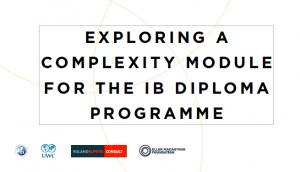Complexity as a big idea for education: A high school curriculum.
“The real voyage of discovery lies not in finding new landscapes, but in having new eyes.”
Marcel Proust
Generation Z is more interconnected than ever before – with each other and with the world. To tackle the interconnected challenges facing them, such as climate change, inequality or robotisation, they need the intellectual running room of a science of interconnected systems.
Yet in school they learn to build scientific knowledge about the world mainly through a reductionist lens. Separating a problem into pieces and solving each one separately is the powerful approach that underpins much of the Western scientific method. Reductionism is a great approach, except when it is not. That is when the interconnections between the pieces essentially influence the behavior of a system. Those systems are complex, from the Latin plexus for braiding. Complexity is the science of braided systems.
Wise scientists have always realized that reductionism was not perfect, but it allowed for great progress leveraging the mathematical tools of the day. The natural sciences ventured deeper into reductionism than the social sciences, but the approach was so dominant that it also came to dominate political discourse and shape the way we see and intervene in the world.
Since the mid-1980’s a slow-motion scientific revolution has been unfurling. Catalysed by the founding of the Santa Fe Institute, today most universities have complexity programs in most faculties – but it is not yet part of school education.
As complexity connects so well with student’s intuitions about the work, in 2016 I proposed to the International Baccalaureate Organization (IBO) to develop a curriculum for their diploma programme. The IB provides the curriculum for over 5000 public and private schools around the world. This led to a dialogue with interested IB teachers and schools. In partnership with Sara Heinrich of the Ellen MacArthur Foundation we piloted a 14-hour complexity curriculum at the Mahindra United World College in Pune.
One of the students commented: “I tend to think more of systems as complex rather than complicated, for instance, I currently see that although disciplines are taught separately and have different foundational approaches, they are all interconnected. You cannot do one without the other, which is especially evident for me, in the natural sciences. I think that I am becoming more aware of the fact that nothing in fact happens in a linear progression, but in flux wherein exists a complex web of stakeholders, cause and effects etc.”.
The curriculum is now available for all under a Creative Commons license. Download it HERE.
Tags: EducationCategorised in: Complexity, Education


Comments are closed here.